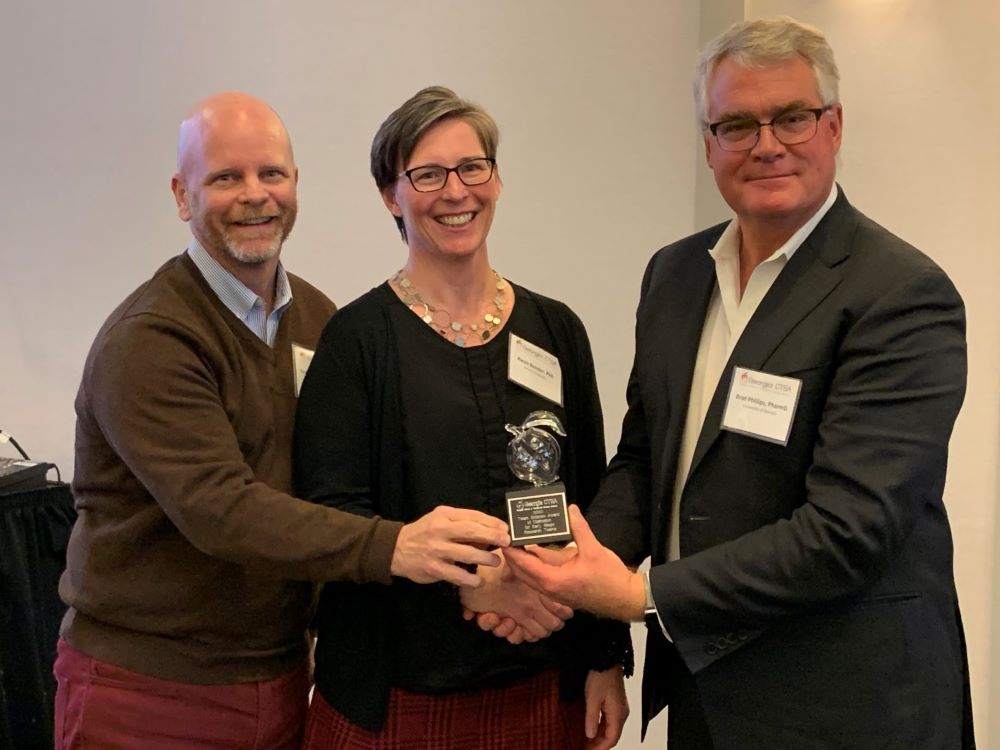Georgia CTSA Pilot Grants Power Innovative Research

“Funding through the Georgia CTSA Pilot Grants program was invaluable to me as an early career scholar. It has provided me opportunities for ongoing research projects and continued collaboration with leading researchers in my field,” says Dr. Alexis Bender.
As a grant recipient, Alexis Bender, PhD, Assistant Professor of Medicine, Emory University, has received numerous benefits from funding through the Georgia CTSA Pilot Grants program. Dr. Bender, a medical sociologist and social gerontologist based at the Wesley Woods Health Center, remarks, “This pilot funding positioned me for a mentored fellowship through the NIH-funded R25 Sustained Training in HIV and Aging Research (STAHR) program to explore the intersections of aging, HIV, and substance use. Additionally, it provided preliminary data for a K01 submission and a CFAR-03 submission. I now have my own preliminary data to use for future proposals and publications as well.”
Georgia CTSA’s Pilot Grants program promotes new networks of multidisciplinary and inter-institutional research teams for the transformation of clinical and translational science in Georgia and beyond. Over the past 10 years, the Pilot Grants program has produced exemplary results for researchers – projects initially funded through the program have received subsequent extramural funding with a 10:1 ROI.
Since 2017, pilot grant recipients have submitted 67 extramural grant applications, and 32 have already been funded as a result of the preliminary work funded by the Georgia CTSA. These supported projects have resulted in 42 publications, 54 manuscripts under review, 90 presentations at national and international meetings, 22 research awards and accolades, and 41 broadcast and print news stories.
The Pilot Grants program is designed specifically to develop the best approaches and methods to address complex clinical and translational research problems. Funding often supports young faculty in developing cutting-edge science, as 45% of the Principal Investigators (PIs) are junior investigators, 44% are women, and 37% are underrepresented minorities (URM). The four academic partners of the Georgia CTSA recognize the critical need for start-up, feasibility, and proof-of-concept resources. Pilot funding is used to support one to two-year projects compatible with the broad aims and objectives of the Georgia CTSA with a growing emphasis on multidisciplinary and team science.
At the 2020 Georgia CTSA Southeast Regional Clinical & Translational Science Conference, Dr. Bender and her research team presented, "The Georgia Geriatric Workforce Enhancement Program," and received the Team Science Award of Distinction for Early Stage Research Team by the Georgia CTSA Collaboration & Multi-Disciplinary Team Science (CMDTS) program. The HRSA-funded Geriatric Workforce Enhancement Program, directed by Dr. Ted Johnson, is designed to improve the health and well-being of older Georgians, their families, and their communities. The program focuses on improving geriatric education of physicians and healthcare professionals, engaging primary care teams to better address what most matters to older patients, and partnering in the community to better serve seniors in rural and underserved areas.
The Georgia CTSA is a statewide partnership between Emory, MSM, Georgia Tech, and UGA and is one of over 60 in a national consortium striving to improve the way biomedical research is conducted across the country. The consortium, funded through the National Center for Advancing Translational Sciences (NCATS) and the National Institutes of Health's Clinical and Translational Science Awards, shares a common vision to translate laboratory discoveries into treatments for patients, engage communities in clinical research efforts, and train the next generation of clinical investigators.